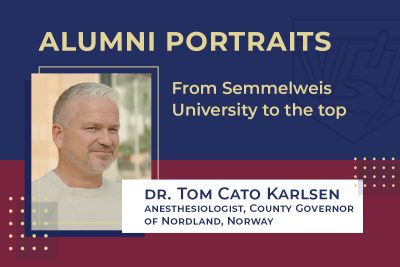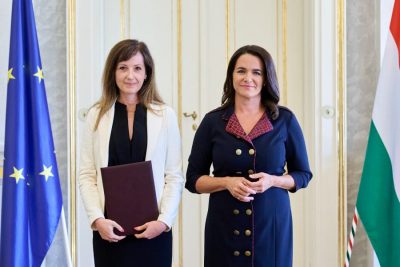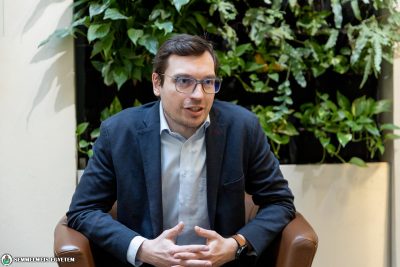The Department of Internal Medicine and Haematology operating with six profiles is to become a leading institution of internal medicine, haematology and clinical immunology. Dr. Tamás Masszi, Director plans to attach particular importance to the development of infectology and the establishment of a gene therapy centre accommodating internationally competitive state-of-the-art procedures. One of the director’s priorities is to create a well-functioning team from the staff of the two departments after their merger as well as to improve patient safety and working conditions. Dr. Tamás Masszi as Chief Medical Officer the Inner Clinical Block aims to provide fast and high level diagnostic and therapeutic activities in the block.
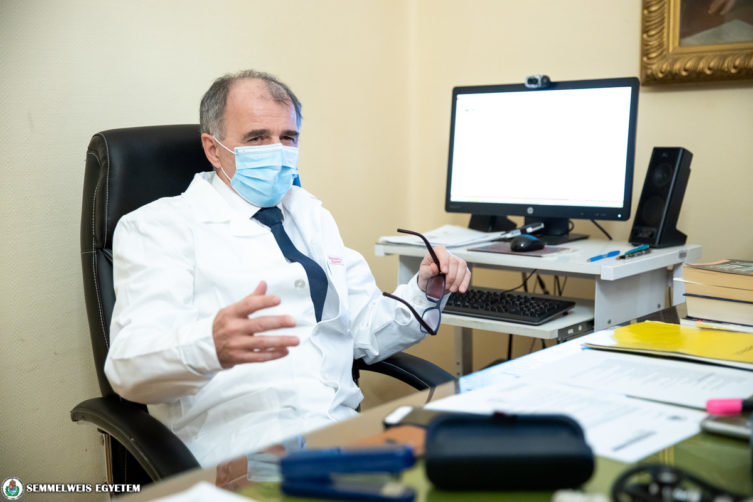 “As a leader, my vision is to run a department where I myself would be happy to work as an employee. The cornerstone of quality work is a suitable environment for staff where they feel comfortable and happy.”, says Dr. Tamás Masszi Director of the Department of Internal Medicine and Haematology appointed on 1 November.
“As a leader, my vision is to run a department where I myself would be happy to work as an employee. The cornerstone of quality work is a suitable environment for staff where they feel comfortable and happy.”, says Dr. Tamás Masszi Director of the Department of Internal Medicine and Haematology appointed on 1 November.
The department was established on 15 May 2020 with the merger of the former 2nd and 3rd Departments of Internal Medicine; the merger was supervised by Dr. Tamás Masszi as Rector’s Commissioner and then was acting director until his appointment in November. Following the merger, the institution has six profiles: haematology and immunology have become leading fields and the latter is supported by the Departmental Group of Rheumatology and Clinical Immunology set up on 1 October 2020. Cardiology and metabolic diseases are also priority areas, while oncology and gastroenterology are included in the department’s profile with reduced capacities, which have been channelled into the activities of the Department of Internal Medicine and Oncology and the 1st Department of Surgery and Interventional Gastroenterology.
“Our educational activities also follow this structure and our goal is to enable everyone to teach the special patient profile they are responsible for. Our aim is to introduce infectology as a new profile. The Departmental Group of Infectology have already been part of the department but we would like to make education in this field more important. We would also like infectologists to be present at other departments as consular doctors.”, said Dr. Tamás Masszi.
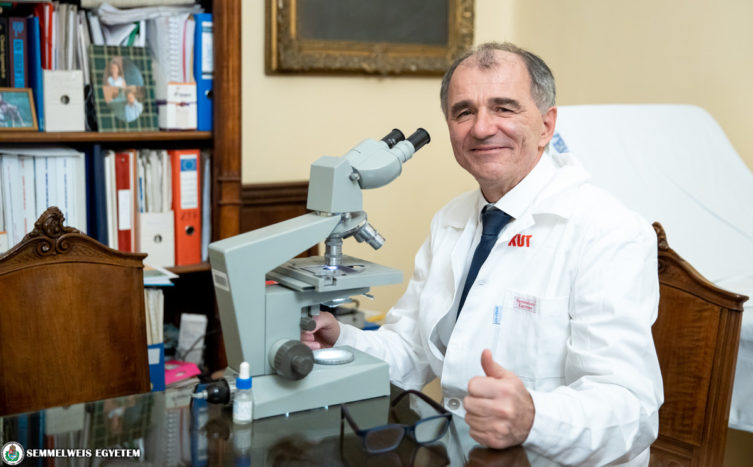 The Department is meant to be outstanding not only in Hungary but to become one of the best in an international setting as well. Setting up a gene therapy centre with state-of-the-art procedures based on the Research Laboratory is one of the steps achieving this goal. A well-known form of cellular therapies is stem cell transplantation, but technological advances have gone beyond. It is planned that the centre will use CAR-T cell therapy developed recently in the USA, T cell therapy that has also been known only for a few years and cell therapies based on stromal stem cells. The latter include the immunosuppressive use of mesenchymal stem cells that are able to produce various tissues (eg. cartilage, myocardium) and the development of regenerative medicine based on the use of these stem cells.
The Department is meant to be outstanding not only in Hungary but to become one of the best in an international setting as well. Setting up a gene therapy centre with state-of-the-art procedures based on the Research Laboratory is one of the steps achieving this goal. A well-known form of cellular therapies is stem cell transplantation, but technological advances have gone beyond. It is planned that the centre will use CAR-T cell therapy developed recently in the USA, T cell therapy that has also been known only for a few years and cell therapies based on stromal stem cells. The latter include the immunosuppressive use of mesenchymal stem cells that are able to produce various tissues (eg. cartilage, myocardium) and the development of regenerative medicine based on the use of these stem cells.
“We want to operate as an educational centre for cell therapies and our long term goal is to be able to produce such cells as well. This way, the research laboratory, which is also involved in direct patient care, will achieve a truly translational activity.”, he said.
Dr. Tamás Masszi also spoke about ongoing work at the department: the aim of the 2-billion-forint investment is the renewal of the department’s infrastructure. This involves the establishment of a 40-bed area suitable for high level haematology care and a haematology hospital. In the other building the current patient care units are being modernized. Patient care is uninterrupted during the renovation, thanks to the cooperation of the Department of Transplantation and Surgery and the Department of Dermatology, Venereology and Dermatooncology.
Since 1 September 2020, Dr. Tamás Masszi has been the Chief Medical Officer of the Inner Clinical Block. To improve patient care, it is necessary to unify the different departments of the Inner Clinical Block by strengthening cooperation, which he considers a priority. To this end, the further development of the laboratory of the Department of Transplantation and Surgery will allow the extension of the laboratory’s services to all the departments of the Inner Clinical Block. Thus, not only urgent tests will be performed at the lab, enabling the doctors to get the results quicker. In the field of imaging, a collaboration has begun between the Department of Internal Medicine and Haematology and the Department of Transplantation and Surgery. The former provides high-quality CT capacity and the latter provides the possibility of cardiac ultrasound for patients in both institutions. The new Chief Medical Officer considers it important to develop unified intensive care within the limits of the Inner Clinical Block and to have a resurrection team available 0-24. A corridor physically connecting the two departments will facilitate even closer collaboration.
Besides innovation, Dr. Tamás Masszi is reminded of tradition by his desk which belonged to Frigyes Korányi, who was director of the department between 1865 and 1908. Another director, Imre Haynal is memorable for him, because his parents used to work at the department under his leadership.
“Being surrounded by such traditions is heart-warming and challenging at the same time.”, he said.
Pálma Dobozi
Photo: Attila Kovács – Semmelweis University
Translation: Ágnes Raubinek
